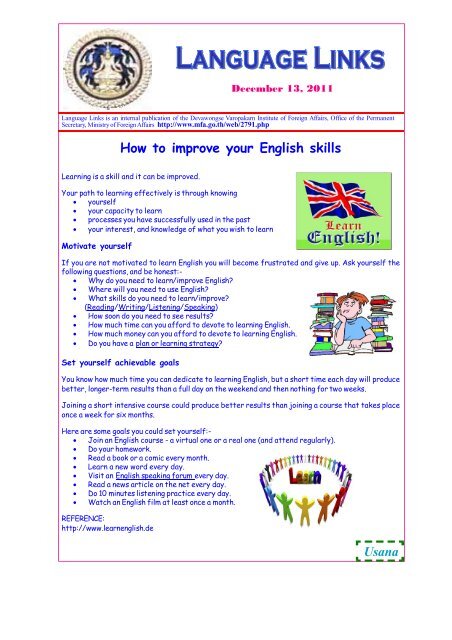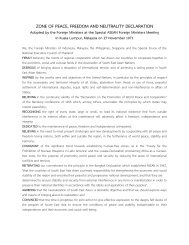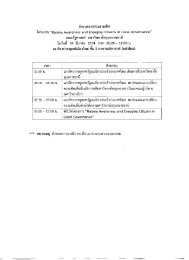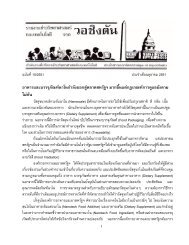How to improve your English skills Usana
How to improve your English skills Usana
How to improve your English skills Usana
You also want an ePaper? Increase the reach of your titles
YUMPU automatically turns print PDFs into web optimized ePapers that Google loves.
December 13, 2011Language Links is an internal publication of the Devawongse Varopakarn Institute of Foreign Affairs, Office of the PermanentSecretary, Ministry of Foreign Affairs http://www.mfa.go.th/web/2791.php<strong>How</strong> <strong>to</strong> <strong>improve</strong> <strong>your</strong> <strong>English</strong> <strong>skills</strong>Learning is a skill and it can be <strong>improve</strong>d.Your path <strong>to</strong> learning effectively is through knowing• <strong>your</strong>self• <strong>your</strong> capacity <strong>to</strong> learn• processes you have successfully used in the past• <strong>your</strong> interest, and knowledge of what you wish <strong>to</strong> learnMotivate <strong>your</strong>selfIf you are not motivated <strong>to</strong> learn <strong>English</strong> you will become frustrated and give up. Ask <strong>your</strong>self thefollowing questions, and be honest:-• Why do you need <strong>to</strong> learn/<strong>improve</strong> <strong>English</strong>?• Where will you need <strong>to</strong> use <strong>English</strong>?• What <strong>skills</strong> do you need <strong>to</strong> learn/<strong>improve</strong>?(Reading/Writing/Listening/Speaking)• <strong>How</strong> soon do you need <strong>to</strong> see results?• <strong>How</strong> much time can you afford <strong>to</strong> devote <strong>to</strong> learning <strong>English</strong>.• <strong>How</strong> much money can you afford <strong>to</strong> devote <strong>to</strong> learning <strong>English</strong>.• Do you have a plan or learning strategy?Set <strong>your</strong>self achievable goalsYou know how much time you can dedicate <strong>to</strong> learning <strong>English</strong>, but a short time each day will producebetter, longer-term results than a full day on the weekend and then nothing for two weeks.Joining a short intensive course could produce better results than joining a course that takes placeonce a week for six months.Here are some goals you could set <strong>your</strong>self:-• Join an <strong>English</strong> course - a virtual one or a real one (and attend regularly).• Do <strong>your</strong> homework.• Read a book or a comic every month.• Learn a new word every day.• Visit an <strong>English</strong> speaking forum every day.• Read a news article on the net every day.• Do 10 minutes listening practice every day.• Watch an <strong>English</strong> film at least once a month.REFERENCE:http://www.learnenglish.de<strong>Usana</strong>×
2Country (Area)“The way in which emotions are displayed in gesture can vary greatly from culture <strong>to</strong>culture. Even the most simplistic gesture can cause outrage if exhibited in the wrongsetting. This quiz looks at the hows and whys. Good luck!”1. The “OK” sign made by forming a circle with <strong>your</strong> thumb and forefinger is generallyused by Bri<strong>to</strong>ns and Americans <strong>to</strong> tell each other that everything is fine. What lessflattering symbol would a Kuwaiti take this gesture <strong>to</strong> be? A destructive black hole The evil eye Poverty in life Their emptiness in loveThe correct answer is “The evil eye”Although this would not necessarily be offensive <strong>to</strong> the Kuwaiti (or other inhabitants of the Middle-East) it would not win you many friends as you would then be associated with evil.On the other hand if you were <strong>to</strong> make the “OK” gesture <strong>to</strong> a German, Turk or Greek this may be veryoffensive. The circular shape made suggests <strong>to</strong> the recipient that they are a part of the body which mayresemble that shape and, by association, are homosexual.Nevertheless, the gesture continues <strong>to</strong> have the same positive meaning in both Britain and the USA. It isoften used <strong>to</strong> compliment a meal as eating with a mouthful is seen as rude in these westernised cultures.It is also a common gesture in scuba diving <strong>to</strong> tell others you are fine as the “thumbs-up” is taken <strong>to</strong> mean“ascend”.2. When both middle and index fingers are held up in the USA it is seen as representing“V for vic<strong>to</strong>ry” regardless of whether you palm is facing <strong>to</strong>wards or away from you.<strong>How</strong>ever, in the UK, what is the intention of a person doing “the V-sign” with the back oftheir hand pointing <strong>to</strong>wards you? To insult you To invite you for dinner To propose <strong>to</strong> you To attempt <strong>to</strong> sleep with youThe correct answer is “To insult you”In the UK, when “the V-sign” is made with <strong>your</strong> palm facing the person you are signalling <strong>to</strong> you areagain displaying “V for vic<strong>to</strong>ry”. Americans must be careful when visiting the UK or Australia <strong>to</strong> havetheir hand facing the right direction so not <strong>to</strong> offend the locals as George Bush Senior did during hisvisit <strong>to</strong> Australia in 1992.Likewise one of the most widely recognised hand gestures in the world is the raising of the middlefinger (also known as “the finger”). This causes serious offense in most cultures it is displayed <strong>to</strong>. Inthe Middle-East a common insult is a variation of “the finger” as it is inverted <strong>to</strong> suggest that therecipient is impotent.Source: http://www.funtrivia.com/playquiz/quiz31230423c0d88.htmlPiyaporn
31. Which is correct ‘on holiday‘ or ‘for a holiday‘?You can use ‘for’ or ‘on’ with holiday and both would be correct. You can also drop thearticle ‘a’ when using ‘on’ (the third sentence below). Look at these three sentences, all ofwhich are correct:1. I went there for a holiday.2. I went there on a holiday.3. I went there on holiday2. The phrase, “for free”, is heard a lot these days. What is the grammaticalexplanation?You are right that this is a redundant preposition. It could be thatpeople confuse it with ‘for nothing’ - ‘You can get them for nothing’- which is correct. <strong>How</strong>ever, as you have remarked, the use of ‘for free’is creeping in<strong>to</strong> our usage. Time will tell if it becomes an acceptedusage but for the moment you can safely say that the preposition isredundant and therefore ‘free’ should be used without ‘for’, e.g.,‘buy one and get one free’ rather than ‘ buy one and get one for free’.3. Can we say I arrive <strong>to</strong> work at 9 o’clock or do we need <strong>to</strong> use “at”? or do we need<strong>to</strong> use “for”? Thank youArrive‘ can be followed by several prepositions depending on what is following, look atthese:• I arrived for work in the morning. (arrive + for where ‘work’ is a task or job <strong>to</strong>undertake)• I arrived at work in the morning. (arrive + at where ‘work’ is a place)• I arrived in time <strong>to</strong> see her. (arrive + in time where there is a temporal aspect)So, in terms of <strong>your</strong> question, I would say that you can use ‘for‘ or ‘at‘ depending on whatsense you want <strong>to</strong> give ‘work’ (a place or a task).http://www.english4<strong>to</strong>day.com/englishgrammar/grammarfaq/grammar_category.cfm?tid=8Napassawan
4Learn <strong>English</strong> MistakesCommon Mistakes and Confusing Words in <strong>English</strong>Let’s face it, <strong>English</strong> can be confusing. A lot of words are similar but with differentmeanings. It is almost impossible <strong>to</strong> avoid making mistakes in <strong>English</strong>, but if you canunderstand these explanations, you might be able <strong>to</strong> avoid making these ones.“<strong>How</strong> do you do?” vs “<strong>How</strong> are you?”<strong>How</strong> do you do?This is not a question. It is another, very formal way of saying ”Hello.” It is alsovery British.The correct response is; “Pleased <strong>to</strong> meet you.” or “<strong>How</strong> do you do.” or just “Hello.”We only really use it the first time we meet someone.<strong>How</strong> are you?This is a question, but the person asking it doesn’t really want <strong>to</strong> know the truth about<strong>your</strong> aching back or headache.A polite response is; “I’m fine thanks. And you?”Shaking HandsWhen meeting someone formally for the first time,we shake their hand and say “<strong>How</strong> do you do?”or “Pleased <strong>to</strong> meet you.””<strong>How</strong> do you do?” isn’t really a question, it justmeans “Hello”.When young people meet informally they sometimessay “Give me five!” and slap their hands <strong>to</strong>gether (high five).Generally we do not shake hands with people we know well.REFERENCE:http://www.learnenglish.de/mistakes/howdoyoudovshowareyou.htmEDITORIAL TEAMEdi<strong>to</strong>r : Mr. David RogersEdi<strong>to</strong>rial Team : Ms. <strong>Usana</strong> WongnarkpetMs. Napassawan PhromsumphunMs. Piyaporn JuntaratProduction :Ms. Raevadee Tantayavit
















